Trust and support are fundamental to motivating your team to do well at work. Unfortunately, some managers don’t understand the basics of leadership and only ever aim to punish others. At times, these punishments are beyond ludicrous. And some managers specifically discriminate against remote workers.
Case in point, Reddit user u/SpecterGygax, who works remotely, recently went viral on the r/antiwork online community after sharing just how much their boss micromanages them. They received an actual warning for going to the bathroom. Scroll down for the full story, as well as the internet’s reactions. Bored Panda has reached out to the author via Reddit, and we’ll update the article as soon as we hear back from them.
Some bosses micromanage their employees to an incredibly unhealthy extent

Image credits: Queenmoonlite (not the actual image)
One remote employee shared how their manager called them out for taking a restroom break
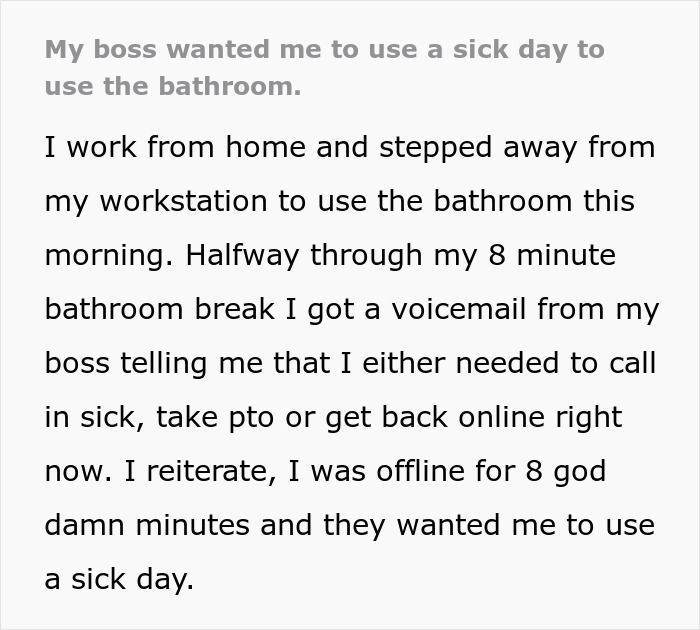
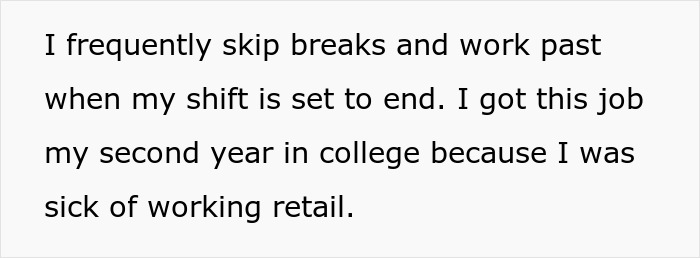
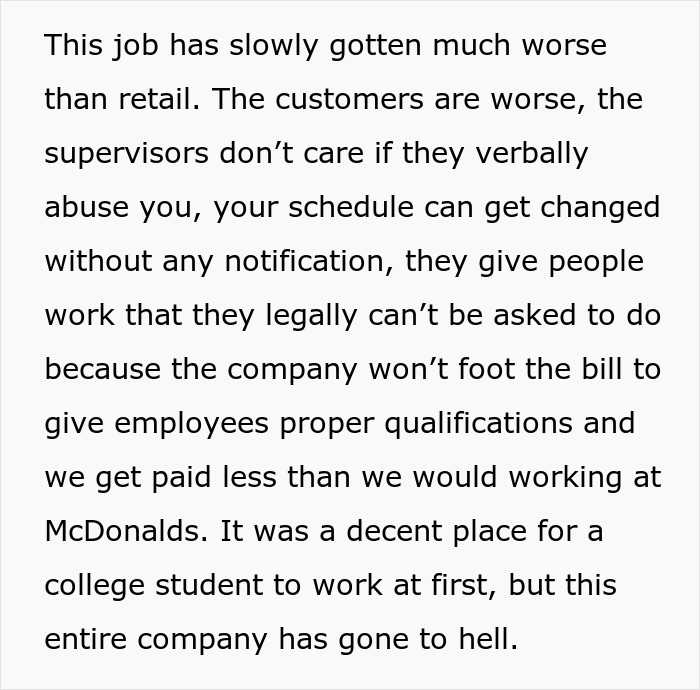

Image credits: Prostock-studio (not the actual image)
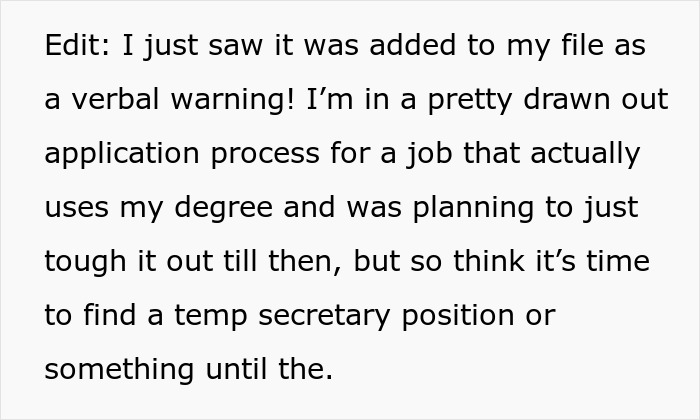
Image credits: u/SpecterGygax
Micromanagers don’t trust their employees and track their activities to stay in control
As Indeed points out, micromanagers fundamentally don’t trust their staff to do a good job and they want to be in control, at all times. They want frequent updates about tiny details.
They’re unwilling to delegate tasks because they believe they can do things better themselves. And if they do delegate, they might try to ‘fix’ their colleagues’ work.
Micromanagers also tend to be obsessed with documentation and detailed reports. What’s more, they’ll feel awful if they’re not included in work decisions.
One way to tell if you’re dealing with a micromanager at work is to see whether they’re keeping tabs on employee communication. If someone lashes out at others when they lose control, they might be a huge micromanager.
The way the boss handled the entire situation speaks volumes about the company’s ‘culture’
As the OP explained in their post, the entire situation was unfair from start to finish. First of all, they have to deal with a boss who is a massive micromanager, tracking their every move. Secondly, the boss set a precedent that some restroom breaks can be ‘too long,’ which is, frankly, ridiculous.
Third of all, there’s bound to be frustration brewing at the company if nature calls… and your boss calls along with it, sending a voicemail. The bar for a verbal warning that goes on someone’s record is incredibly low and it’s going to be awful for motivating employees.
And fourth, the author pointed out how they often work overtime and skip their breaks as well. This shows how inflexible some managers are when it comes to remote work. It’s unlikely that someone would be given a verbal warning if they physically went to the bathroom if they were at the office. Flexibility is something that many workers value very highly. Managers who don’t prioritize it can end up losing some of those talented employees.
Instead of looking at work results or the broader context, some managers use the simplest metric possible to see if someone is being ‘productive’: the fact that they’re online and communicating with you.
Being productive every single second of the workday is impossible
Some bosses take this micromanagement to the extreme, demanding that their workers install tracking software on their computers. They want their staff to work every single second of the workday, without downtime.
This is ludicrous for a few reasons. Namely, it creates a situation where pretending to do something is seen as more valuable than, y’know, actually working. On top of that, it fosters mutual mistrust. Moreover, these managers completely ignore the reality of how work gets done.
Research shows that the average worker is productive for less than 3 hours per workday. Or, to put it more simply, people get tired quite quickly.
‘Inc’ reports that employees spend over an hour reading news websites, 44 minutes checking their social media, and 40 minutes talking to their colleagues about non-work stuff.
The rest of their time is spent searching for new jobs, taking smoke breaks, making calls to people, making drinks, sending messages, eating snacks, and making food.
In other words, someone who works at the office may not be more productive than someone working remotely. There are plenty of distractions (including necessary restroom breaks) for everyone.
Management needs to find ways to motivate their staff, not just punish them for minor transgressions
Productivity and drive will depend on an employee’s work ethic, motivation, and sense of purpose. Someone who loves what they do, receives fair pay, and has a supportive manager is going to move mountains—no matter if they’re at home, in the office, or at a sunny beach in a tropical location.
Of course, this doesn’t mean that there aren’t some bad actors out there. Some workers can and do abuse the WFH system to their advantage, pretending to work while getting paid. Remote and hybrid work are great systems, so long as everyone plays by the agreed-upon rules.
These rules have to make sense. Most employees probably don’t want to be threatened for going to the restroom. Similarly, managers expect their staff to prioritize their work, not side projects, chores, and leisure activities.
If there’s a genuine issue with productivity and effort, bosses definitely need to address it. However, these requirements have to be fair and grounded. Sanctioning someone for being offline for a few minutes is neither of those things. And these bosses might soon find their most hard-working and talented employees jumping ship and sailing for greener pastures.
The author shared some more info in the comments
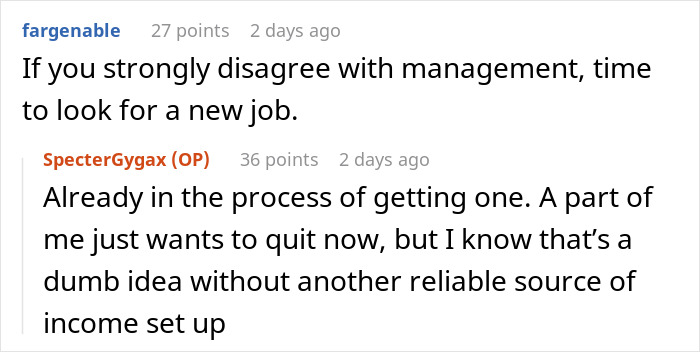
Here’s how the Antiwork online community reacted to the story. Many readers had useful suggestions for the worker

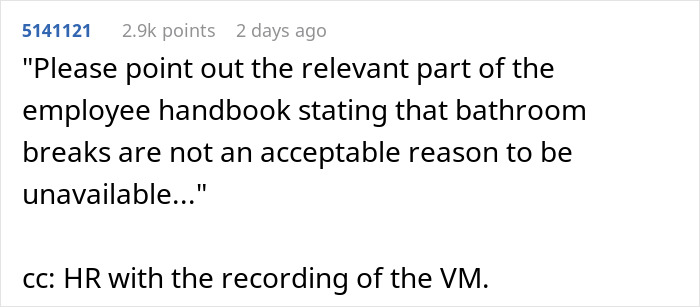
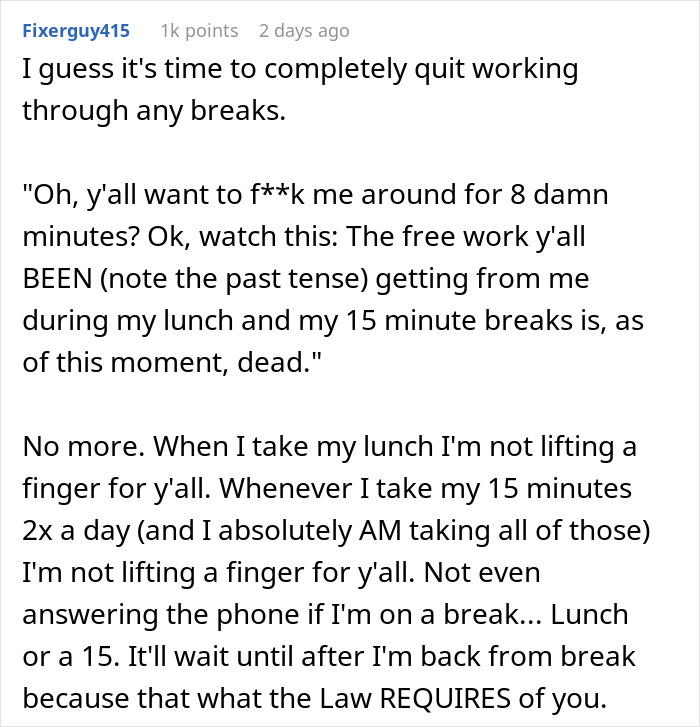
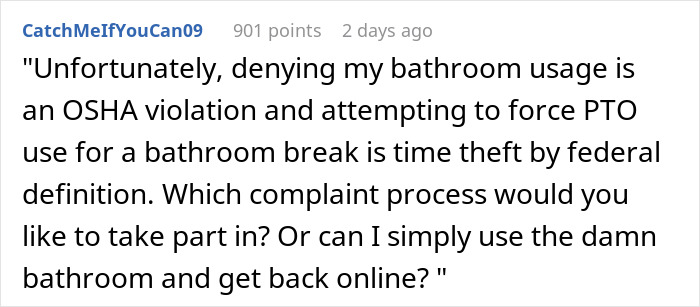


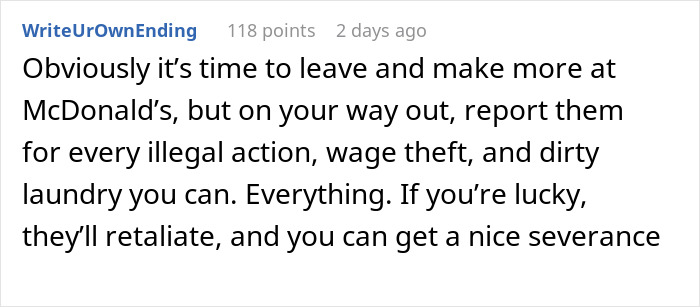



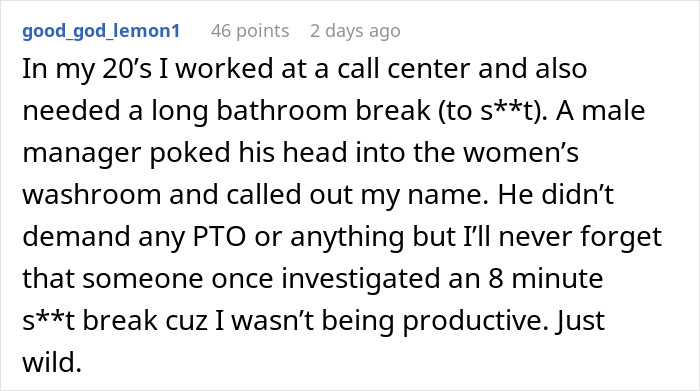


from Bored Panda https://ift.tt/bGAVxdw
via IFTTT source site : boredpanda